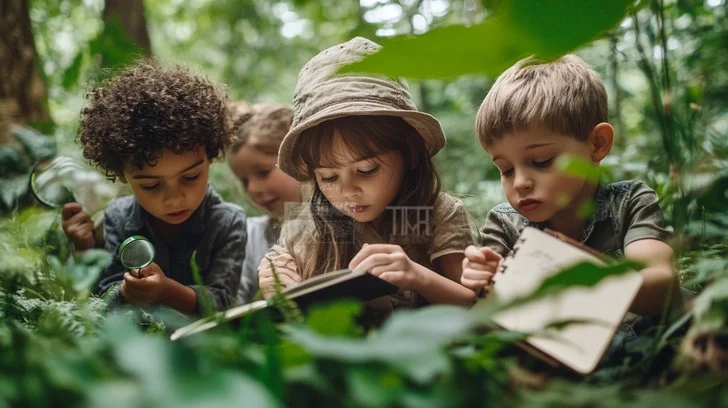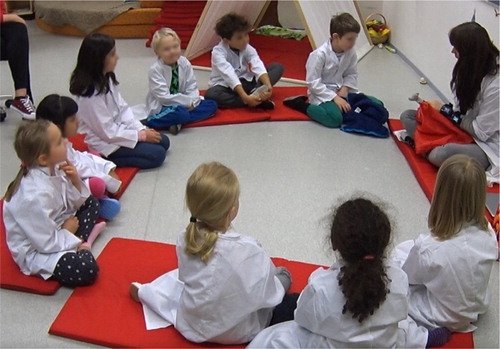The Importance of Nature Exploration
Exploring nature with preschoolers offers valuable opportunities for them to engage with the world around them. At this age, children are naturally curious and eager to explore their surroundings. Nature provides a rich, ever-changing environment that stimulates their senses and encourages hands-on learning.
Furthermore, spending time outdoors helps preschoolers develop cognitive, social, and emotional skills while fostering creativity and a love for learning.
Sensory Learning Through Nature
One of the key benefits of nature exploration is the chance for sensory learning. Preschoolers engage all their senses—sight, sound, touch, and smell—when they explore natural environments.
For instance, children can touch the rough bark of a tree, smell the flowers, listen to birds chirping, or watch the leaves flutter in the wind. These sensory experiences help young children build a better understanding of their world and improve sensory processing skills.
Promoting Physical Activity
Nature exploration is a great way to keep preschoolers active. Whether they’re climbing rocks, running through fields, or jumping in puddles, outdoor activities promote physical health and motor skills.
Additionally, outdoor play strengthens muscles, improves balance, and boosts coordination. It’s an ideal way to develop a child’s gross motor skills while keeping them entertained and engaged.
Building Problem-Solving and Critical Thinking Skills
In nature, preschoolers often encounter challenges that require problem-solving. Whether it’s figuring out how to cross a stream, identifying a bird, or finding the best spot to sit for a picnic, nature offers endless opportunities for children to think critically.
Exploring nature encourages children to ask questions, make observations, and experiment. For example, children may wonder why a leaf turns red in the fall or how a snail moves. These questions lead to learning moments that deepen their understanding of the natural world.

Fostering a Sense of Wonder and Curiosity
Nature naturally sparks a sense of wonder in young children. From discovering a hidden bug to watching the changing sky, the outdoor world is filled with surprises.
As preschoolers explore, they develop a sense of awe that promotes curiosity and learning. By encouraging children to ask questions and seek answers, parents and educators help instill a lifelong love of exploration.
Enhancing Social Skills Through Group Activities
Exploring nature with other preschoolers can enhance social skills and teamwork. Outdoor activities such as nature walks, scavenger hunts, or group games provide opportunities for sharing, cooperation, and communication.
Moreover, children learn how to interact with peers, negotiate roles in games, and solve conflicts in a group setting. These experiences are essential for building social competence and emotional intelligence.
Connecting with the Environment and Developing Environmental Awareness
Spending time in nature helps preschoolers develop a connection to the environment. They begin to understand the importance of plants, animals, and ecosystems, learning about the interconnectedness of life.
As children explore their surroundings, they develop an appreciation for nature and a growing sense of responsibility toward protecting the environment. Simple lessons about littering, recycling, and caring for animals can lay the foundation for environmental stewardship.
Encouraging Imagination and Creativity
Nature provides endless opportunities for imaginative play. Preschoolers can pretend to be explorers in a jungle, pirates on a treasure hunt, or animals in a forest. These imaginative games stimulate creativity and allow children to role-play different scenarios.
In addition, the natural world offers a wealth of materials—rocks, sticks, leaves, and flowers—that children can use to create their own works of art or build structures, further sparking their creativity.
Improving Focus and Attention
Nature-based activities also improve children’s ability to focus and pay attention. Studies have shown that children who spend time outdoors have better concentration and are less likely to feel distracted.
Being in nature helps calm the mind and improves mental clarity. As preschoolers engage in nature-based learning, they become more attuned to their surroundings and can better focus on tasks.
Tips for Exploring Nature with Preschoolers
- Start Simple: Begin with short nature walks or visits to a local park. Allow preschoolers to explore at their own pace.
- Be Curious Together: Ask questions and encourage your child to share their thoughts. Explore the answers together.
- Bring Tools: Simple tools like magnifying glasses, binoculars, or a nature journal can enhance the experience.
- Incorporate Activities: Turn nature exploration into a learning activity, such as a scavenger hunt or a nature-themed art project.
- Respect Nature: Teach your child to respect the environment by showing them how to gently interact with nature.
Conclusion
Exploring nature with preschoolers is an enriching experience that offers numerous benefits for their development. Through outdoor play, children learn to observe, explore, and interact with the world around them, fostering curiosity, physical activity, and creativity.
In addition, nature exploration helps build social skills, enhances problem-solving abilities, and deepens a child’s understanding of the environment. By incorporating nature-based activities into their daily routines, we provide preschoolers with valuable opportunities for growth, learning, and connection to the natural world.










